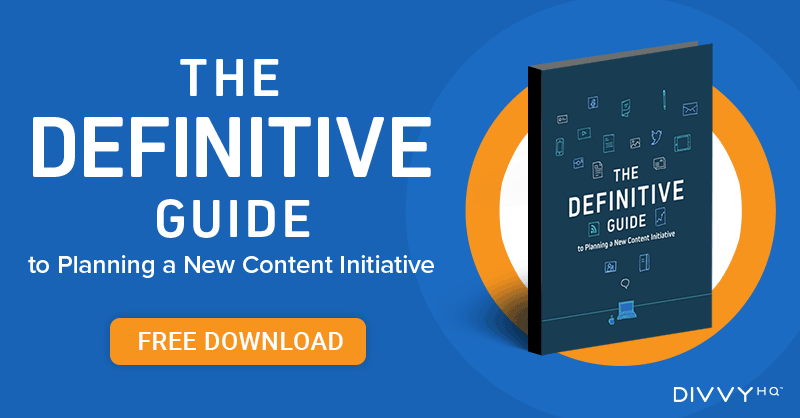Why and How Content Planning Differs from Content Strategy
If you use the words “planning” and “strategy” interchangeably, it’s probably time to stop. Especially if the word “content” comes before them.
We’re not exactly breaking news here: the world of content marketing is more complex and wide-reaching than ever before. It’s also more ingrained. Joe Pulizzi has argued that in 10 years, content marketing will just be marketing, and one could make a good case we’re close to that point already.
A well-constructed content strategy is critical for attracting customers and growing your brand. But you’ll never execute one without a structured and organized content plan, fueled by a sustainable workflow and consistent process.
Let’s explore the key distinctions between content strategy and content planning and how to connect them for harmonious results.
What is Content Planning?
Content planning is the structure by which your company determines which content initiatives to execute and when. It’s all about processes and workflows.
A content plan can help you overcome the challenges you face daily with content marketing, including:
- Ensuring content is unique and relevant: collaborative planning helps you get more ideas from more stakeholders
- Account for resources at hand: with better workflows and processes, the team you have is more effective and productive
- Optimized engagement for every piece of content: with a content plan, you’ll be able to give every piece of content the attention it needs so that it maintains high engagement
- Keeping on schedule: with a content calendar, you’ll be able to mitigate the common issues that content teams have with staying on top of timelines, tasks, and projects
The quote “If you fail to plan, you plan to fail,” has been thrown around for ages. Like most quotes, it’s often attributed to Benjamin Franklin, although he probably never said it. Regardless of its source, this statement endures and gets repeated ad nauseum for one simple reason: it’s absolutely true.
In the Content Marketing Benchmarks, Budgets, and Trends Report compiled by CMI and MarketingProfs, only 8% of respondents rated the project management flow in their content creation process as “Excellent,” and only 28% dubbed theirs “Very Good.” Many organizations are fraught with inefficiencies and bottlenecks. These typically sprout up due to poor planning or a lack of planning, and they throw strategies into disarray.
Here are the integral components of effective content planning:

Your content strategy could be considered your vision. Your content plan is how you get there. Even the most well-crafted content strategy is doomed without a clear and transparent plan for putting it into action. This tends to be one of the foremost challenges for larger, more dispersed, or just plain busy content marketing teams.
What is Content Strategy?
There are many ways to define the term, but I like this one via Distilled: “A content strategy is the high-level vision that guides future content development to deliver against a specific business objective.”
The most important words in this content strategy definition, in my opinion, are “vision” and “objective.” In many ways, a strategy is ambiguous and intangible — a guiding framework that accounts for every element of your content operation. And it always needs to lead toward a concrete goal (usually, some variation of “make more money”).
Your content strategy must include research (industry and competitive), goals, messaging, and themes, all while focusing on your ideal buyer and his or her needs, motivations, and challenges.
On the technical side, content strategy encompasses the creation, publication, and governance of your content. Within your strategy, you have to manage every piece of content and its path from ideation to distribution.
Strategy is the umbrella under which all of your content marketing tools and tactics nest. But turning a strategic vision into reality won’t happen on its own. Content planning makes it so.
What Does Content Planning Involve?
When content planning, there are many considerations to ponder. You have to decide what you will do and how you will do it.
Think about these things:
- Do your topics align with the themes and messaging in your strategy?
- Is every piece of content going to be something your target audience will want to consume — is it relevant and helpful?
- Does the type of content make sense for your audience? For example, are some of your buyers more interested in video versus long-form content?
- Does your industry have seasonal or promotional periods? How will those affect your plans?
- What content opportunities have you found through your competitive research? For example, does your audience appreciate data-driven whitepapers, but there aren’t any out there?
- Do you have a content repurposing plan? Can you take an eBook and break it down into individual posts? Can you make an infographic and interactive video with the same data?
The Elements of Content Planning
So, you have lots of questions to answer to inform your content planning, and there are several components that are critical to developing your plan.
- Documenting production and content workflows: all stakeholders and team members are following the same process and you have efficient workflows that mitigate roadblocks
- Content calendar: visible scheduling on a central content marketing software platform that enables easy updates and communication
- Onboarding and training: building a smooth and repeatable setup to remove friction
- Promotion and distribution: identifying the right channels to connect with your target audience
- Transparency and communication: instant collaboration between team members to ensure unobstructed teamwork
- Measurement and optimization: being able to track metrics and have access to analytics
Content Planning Builds a Bridge from Strategy to Execution
Getting from Point A (a strategic vision) to a Point B (a fruitful and efficient content marketing engine) is a journey that many companies fail to complete. But when everyone works from the same detailed map, it’s far easier to avoid steering off-course.
Rigorous and regimented content planning helps alleviate many of the most prevalent and pressing strategic struggles inherent to content marketing today:
Keeping Content Powerful and Unique
Collaborative planning helps activate all the creative voices on your team, and enables you to easily tap into your own data to see what’s resonating most with your audience.
Leveraging Resources
The workflow efficiencies yielded by a repeatable and well-defined process tend to reduce the number of requisite resources needed. Better organization and prioritization are crucial benefits of content planning.
Identifying Buyer Pain Points
This is more strategic, driven by research and development of personas, but applying the knowledge you compile requires the right plan.
Creating and Adhering to a Schedule
An interactive editorial calendar that everyone can access and use removes many of the issues that teams (especially larger ones) commonly experience in this regard.
Maintaining Engagement
One of the biggest issues we see in content marketing is the “finish and forget” phenomenon. Teams will publish an asset they’ve worked tirelessly to develop, and then move onto the next project. Improved content planning guarantees that every piece of content gets the follow-up and ongoing love it deserves, leading to superior reach and engagement.
Measuring Effectiveness
Content marketing measurement continues to be one of the top hurdles for marketing teams. Tracking results and consulting metrics, then implementing adjustments, are instrumental aspects of content planning.
Fending Off Competition
When you’re more organized and efficient than others, you inevitably start distancing yourself from them. Because content planning remains a sticking point for a high percentage of businesses, shoring up this area equips you with a big advantage.
To be sure, content planning entails its own set of challenges, but with the right focus and the right tools you can overcome them.
Insights on Content Planning from the Top Marketing Minds
We reached out to leading content marketing professionals who weighed in on how to create a plan and best address content creation and marketing challenges. Here’s what they had to say:
“Knowing audience needs is the only way to ensure planning efforts are impactful.” Share on XRobert Rose – Chief Strategy Advisor, Content Marketing Institute
“Slow the $@$% down. Ground marketing & content strategy in something substantive.” Share on XAnn Handley – Chief Content Officer, MarketingProfs
“Marketers can improve content planning by not planning each piece of content.” Share on XMichael Brenner – Founder, Marketing Insider Group
“The best content plans embrace the creative tension of diverse perspectives.” Share on XMaggie Schneider Huston – Senior Content Manager, UPS
“Content has 2 clients: external audience needs & the internal audience objectives.” Share on XCarlos Abler – Leader – Content Marketing & Strategy, 3M
“The most important thing I track is the waterfall of leads (first click to revenue).” Share on XChris Moody – Content Marketing Leader, GE Digital
“We made an effort to engage our local audience & turn them into ambassadors.” Share on XJanette Maack – Digital Marketing Manager, Visit Vacaville
The DivvyHQ Content Planning Report
A couple of years ago, we released a Content Planning Report to help marketers benchmark and analyze content planning efforts across various dimensions such as strategy, workflow, collaboration, tools, and metrics. With a better understanding of where the industry stands at a high level, your team will be equipped to climb the maturity scale and elevate your operation.
Among the key questions in which you’ll find answers in this free download:
- Which practices have paid dividends for some of the most successful content teams?
- Which content marketing tactics are used most today?
- How many teams rely on content calendars, and to what extent?
- What are the standards for content production volume?
- What are the most common challenges in content planning?
- How are content teams collaborating and what barriers are often holding them back?
- Where are key distinctions emerging between larger and smaller teams?
- Which metrics are being used to track effectiveness?
As Rob Glickman, CMO of Arm Treasure Data, asserts in the report: “An ‘ad hoc’ content strategy is not strategic.”
He’s right. So let’s get away from the ad hoc model. With the data and recommendations inside this sleek 32-page ebook, you can join the movement toward a more strategic, sophisticated and streamlined state of content planning. Then, success will take care of itself.
Download the Content Planning Report and let’s get to work!
Content Planning for Success
“In real life, strategy is actually very straightforward. You pick a general direction and implement like hell.”
— Jack Welch
Well said, Mr. Welch. That really is what it’s all about, and there’s no use in trying to make it any more complicated than that. The “general direction” of your marketing strategy will be dictated by your company and its vision. As for implementing like hell? That’s all about nailing down your content planning.
In the world of content marketing, there’s a very intricate ecosystem. Your content strategy and content plan are some of the most significant parts, and they cannot operate independently. You can’t get to your content marketing goals without both. They are tightly interwoven and dependent upon one another.
Say your content strategy includes your key messaging, which might be a product differentiator that your competitors don’t have. Your content plan should demonstrate how you can leverage this by defining specific topics, format types, and where to distribute this content.
Another example would be that your content strategy has identified major themes to cover throughout the year and has further noted that these themes are important to your target audience. Your content plan needs to then flesh out these themes and determine why they are critical to your buyers and how to convey this in the right content formats.
It may, however, seem overwhelming to connect your strategy to your plan. That’s why so many savvy content marketers depend on a content marketing software solution like DivvyHQ. See how it can revolutionize your content planning by requesting a demo today.



